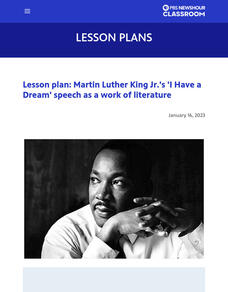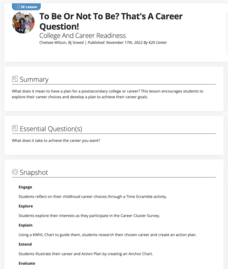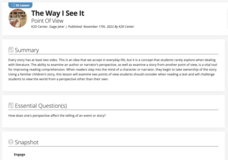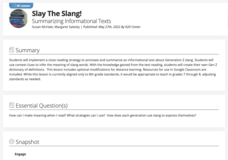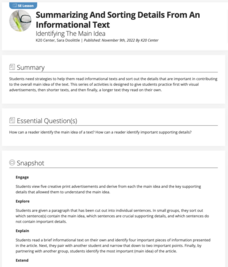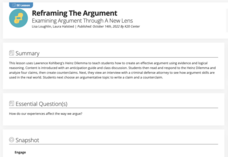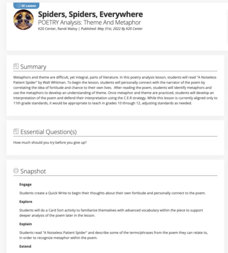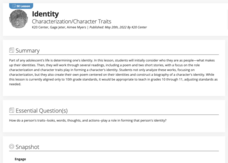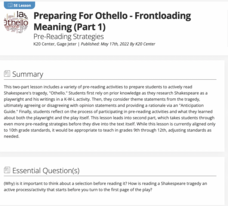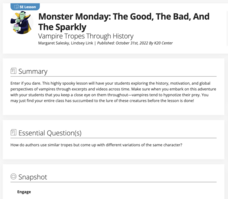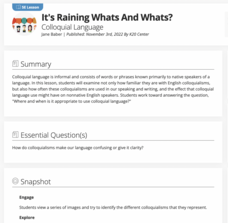PBS
Dr. Martin Luther King Jr.’s ‘I Have a Dream’ Speech as a Work of Literature
To appreciate the oratory of Dr. Martin Luther King Jr.'s "I Have a Dream" speech, scholars examine the rhetorical devices and influences that make the speech so famous. They examine background information, conduct a close reading of the...
PBS
Dr. Martin Luther King Jr.’s ‘I Have a Dream’ Speech as Visual Text
Young historians watch a video of Dr. Martin Luther King Jr. delivering his "I Have a Dream" speech and answer questions that test their knowledge of the event. After discussing the fact sheet, they reread the speech, select a phrase or...
K20 LEARN
Rikki-Tikki-Types of Sentences: Indicative, Imperative, Interrogative Mood
Rudyard Kipling's "Rikki-Tikki-Tavi" and a song from the musical "Hamilton" allow middle schoolers to practice using punctuation to indicate whether sentences are indicative, imperative, or interrogative.
K20 LEARN
Voices from the Past: History and Literature
Art can enhance the understanding of history. That's the big idea in a lesson that has young scholars read Randall Jarrell's poem "The Death of the Ball Turret Gunner" and an excerpt from John Hersey's Hiroshima, which provide a...
K20 LEARN
The War of the Words: Grammar and Parts of Speech
Here's a activity that adds some zip to a study of parts of speech. Class members read two versions of the same article, one loaded with evocative nouns, verbs, adjectives, and adverbs, while the other is missing this sensory language....
K20 LEARN
To Be or Not to Be? That’s a Career Question! College and Career Readiness
Tell your class members Que sera might be if they complete a survey of their interests, examine a list of careers that address these interests, research these careers, and develop an action plan that will help them progress toward their...
K20 LEARN
Things Are Lit at Thornfield: Jane Eyre
Jane Eyre offers scholars an opportunity to practice reading comprehension skills. Pairs are assigned a word from the text, use their prior knowledge, and consider the context, connotation, and denotation of the word to posit a...
K20 LEARN
The Way I See It: Point of View
Robbers see a house from a different perspective than real estate agents. That's the big idea in a lesson about point of view. Groups assume the role of either robbers or real estate agents, note important details in a description of a...
K20 LEARN
Slay the Slang! Summarizing Informational Texts
Middle schoolers get hip to the jive with a lesson about slang. They closely examine examples of slang and use context clues to infer the meaning of the terms. Groups read and summarize an article about a teacher who created a Gen Z...
K20 LEARN
Speak Your Truth: Techniques in Spoken Word Poetry
As part of a study of Spoken Word Poetry, class members watch a series of performance videos and note where poets get their ideas and the performance techniques used by the poets. Pupils then draft and share their poems.
K20 LEARN
Street Cred: Evaluating Sources
A lesson on evaluating sources of information teaches scholars to "think twice" before using a source. Researchers examine a resource's home page, author, and sponsor, as well as the date published and the documentation provided.
K20 LEARN
Speak Up! Four Categories Of Speeches
High schoolers examine the four major types of speeches: informative, demonstrative, persuasive, and extemporaneous. Groups then select one type and craft and share a presentation highlighting this format's characteristics. Finally,...
K20 LEARN
Seeing the Big Picture - Incorporating Thesis, Evidence, Elaboration, and Concluding Statements in Your Essay: Elements of an Essay
Writers examine the elements of an informational essay, identify them in several essay snapshots, and then craft their own to demonstrate what they have learned.
K20 LEARN
Summarizing and Sorting Details from an Informational Text: Identifying the Main Idea
Scholars participate in two activities that teach them to identify the main idea and key supporting details in informational text. Partners create a visual that reflects the main idea and key supporting details in an informational text...
K20 LEARN
Presenting with Confidence: Speech and Debate
Stage fright? Class members learn strategies to overcome stage fright and develop confidence when giving speeches and engaging in debates.
K20 LEARN
Reframing the Argument: Examining Argument through a New Lens
As part of a study of crafting compelling arguments, class members tackle the problem presented in Lawrence Kohlberg's "The Heinz Dilemma." After discussing the dilemma with classmates, writers draft an essay with a claim, support it...
K20 LEARN
"The Interlopers": Are You Ready to Rumble? Conflict, Motivation, and Setting
Capulets and Montagues. Sharks and Jets. Nortenos and Surenos. Gradwitzes and Znaeyms? Hector Hugh Munro's short story "The Interlopers" invites high schoolers to consider the causes of conflicts and reflect on what it takes to resolve...
K20 LEARN
Spiders, Spiders, Everywhere: Poetry Analysis - Theme And Metaphor
Walt Whitman's poem "A Noiseless Patient Spider" provides high schoolers an opportunity to reflect on the importance of perseverance and fortitude. After drafting a Quick Write about a time they tried and tried again to accomplish...
K20 LEARN
Identity: Characterization/Character Traits
"Who am I?" Guy de Maupassant's short story "The Necklace," Julio Naboa Polanco's poem "Identity," and a clip from a Jason Bourne film provide learners with a context to consider the traits that makeup identity. Scholars create a...
K20 LEARN
Preparing for Othello - Frontloading Meaning (Part 2): Pre-reading Strategies
The second lesson in a two-part series that prepares high schoolers for a study of Othello focuses on additional pre-reading strategies. Pupils reflect on what they have learned and consider what they would like to learn about the play....
K20 LEARN
Preparing for Othello - Frontloading Meaning (Part 1): Pre-reading Strategies
The success of any lesson based on a complex text relies heavily on what instructors do before beginning the reading. Before reading Othello, scholars engage in a series of pre-reading activities, including completing an anticipation...
K20 LEARN
Monster Monday - The Good, the Bad, and the Sparkly: Vampire Tropes through History
Fangs, capes, pale skin, and beady eyes! High schoolers investigate the tropes associated with vampires by examining excerpts from stories and films. They then create a timeline that reveals how the depictions of vampires have evolved...
K20 LEARN
It’s Raining Whats and Whats? Colloquial Language
"Yuns betta outten the lights!" Colloquial language is the focus of a lesson that asks middle schoolers to consider the pros and cons of using idioms. They read articles, match expressions with their meaning and place of origin, and...
K20 LEARN
It’s All Greek to Me: Greek and Latin Roots
Ancient Greeks and Romans have contributed far more to modern culture than mythic heroes and stunning architecture. Greek and Latin roots are the foundation of many English words. Middle schoolers engage in an activity that asks them to...


